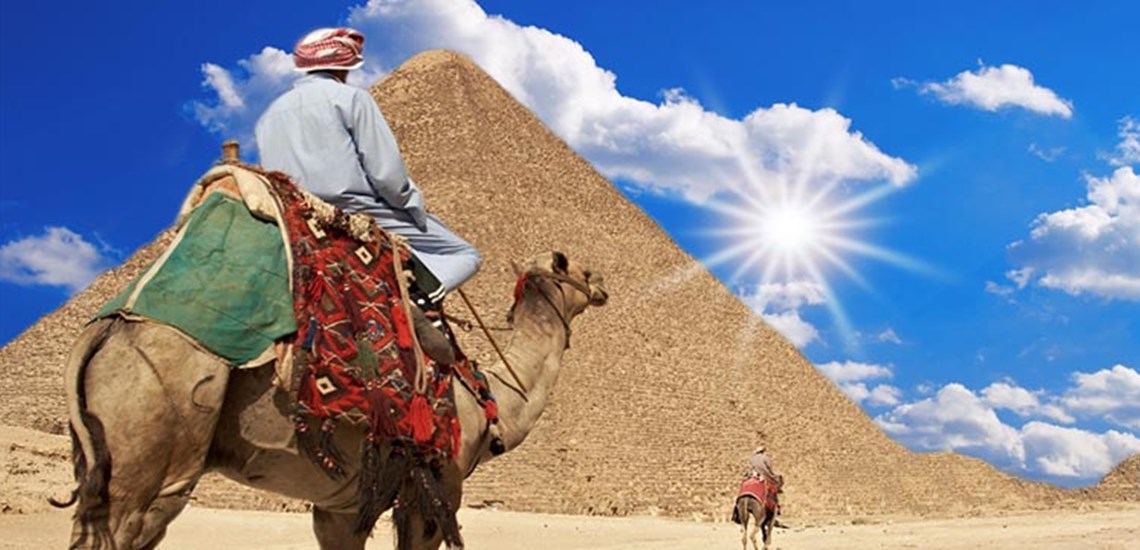Egypt
Brave the desert heat or go during the more temperate wintertime. Either way, a visit to Egypt is bound to be a rewarding cultural experience that will offer single travellers a glimpse to Middle Eastern culture. That said, given its thousands of years of recorded history, Egyptian culture is surely more complex than the stereotypical Middle Eastern country. Having been influenced by the Greeks, the Christians, and the Muslims, the nation prides itself as being the world’s cradle of civilization while also embracing modernity and spearheading contemporary Arab culture.
Despite being a largely Muslim nation, Egypt is home to various historical Christian sites such as the Hanging Church of Cairo and St. Catherine’s Monastery in Sinai. There’s also the Giza Pyramids in Cairo, long-standing symbols of ancient Egypt and its architectural achievements. As for modernity, the tallest building in Egypt, the Cairo Tower, offers a stunning view of the capital.
- Location: Egypt, Africa
- Size: 1,002,450 km2
- Capital: Cairo
- Largest Cities: Cairo, Alexandria, Giza, Shubra El-Kheima, Port Said
- Climate: For the most part, the Egyptian climate is hot and dry except for wintertime, which occurs from December to February.
- Population: Around 90 million people
Language: Arabic
- Religion: Islam, Christianity, Judaism
- Literacy Rate: 66.4%
- Government Type: Semi-presidential republic
- Head of State: President
- Land Borders: The Gaza Strip and Israel to the northeast, the Red Sea to the east, Sudan to the south, and Libya to the west
- Currency: Egyptian pound
- Natural Resources: Petroleum, natural gas, iron ore, phosphates, manganese, limestone, gypsum, talc, asbestos, lead, rare earth elements, zinc
- Main Agriculture: Cotton, rice, corn, wheat, beans, fruits, vegetables; cattle, water buffalo, sheep, goats
- Main Industry: Textiles, food processing, tourism, chemicals, pharmaceuticals, hydrocarbons, construction, cement, metals, light manufactures
- Electricity: 220 V AC, 50 Hz
- Time Zone: GMT+2
Country Tel. Code:+ 20
- Visa/Passport: Australian passport holders will need to acquire visas to enter the country. A renewable 30-day visa for tourists may be obtained at the airport upon arrival.
- Airport: The busiest airport in Egypt is Cairo International Airport (CAI). It serves as the main gateway to the capital and is located 15 kilometres northeast of the city centre. Sharm el-Sheikh International Airport (SSH), the second busiest airport in the country and formerly known as Ophira International Airport, can be found around 8 kilometres away from the city centre of Sharm el-Sheikh. Finally, Luxor International Airport (LXR) is popular to tourists, as it is located near the River Nile.
- Departure Tax: There is no departure tax for passengers leaving Egypt.
- Getting Around: The bus system offers extensive coverage to various destinations across the country. Travellers are advised to opt for buses operated by larger companies for the sake of comfort and safety. The train system, operated by Egyptian National Railways, is a viable alternative, though it is worth noting that foreigners are only allowed to travel first-class. Other options include taking the taxi, travelling by boat, or trying out local transport services for shorter distances.
- Credit Cards: Larger establishments and tourist-friendly areas accept credit cards. Take note that shop owners may charge a usage fee.
- Drinking: The minimum drinking age is 18 for beer and 21 for wine and spirits.
- Shopping: For folk crafts like scarves and pottery, Bedouin blankets and jewellery, stop by Egypt Craft Center or Nomad, both at Cairo. The city is the place to be for anyone looking to do some serious shopping, be it at a bustling souk like Khan al Khalili or a more tranquil setting like Souk el Fustat.
- Tipping: Baksheesh, tips or small tokens of appreciation, are customary and expected. Some bills may include a service charge already, but an additional 5% will surely be appreciated, especially if the service has been exceptional.
100% Australian; we 'get' the Australian travel style. And, better still, our arms are open to welcome our friends from other countries around the world, who'd like to travel with friendly Aussies.©
We've been creating and delivering the best ever holidays for solo travellers since 2006. As a boutique tour operator, we delight in detail, delivering personal service and finding your next best memory.©

